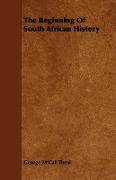- Start
- The Beginning of South African History
The Beginning of South African History
Angebote / Angebote:
PREFACE, IN January 1896 I compIeted a small volume which was published in London and Capetown with the title of The Portugaese in South Africa, and which is now out of print, The preface to that volume was as follows - A very few years ago, when I prepared my Iarge History, the expression South Africa meant Africa south of the Limpopo. Mainly through the ability of one man-the Right Honourable CeciI John Rhodes-that expression to- day means Africa south of the Zambesi. The event which I took as an initial point--the arrival of Van Riebeek in able VaIIey in April 1652.-has thus come to be incorrect for that purpose, the true starting-point now being the arrival of DAnayit in Sofala in September 1505. I have therefore written this volume, in order to rectify the beginning of my work. As Bantu tribes that were not encountered by the Dutch, and that differed in several respects from those south of the Limpopo, came into contact with the Portuguese, it was necessary to enlarge and recast the chapters in my other volumes descriptive of the South African natives. I need not give my authorities for what I have now written concerning these people, for I think I can say with truth that no ono else has ever made such a study of this subject as I have. The Portuguese in South Africa are not entitled to the same amount of space in a history as the Dutch, for they did nothing to colonise the country. I think that in this little volume I have given them their just proportion. In another respect also I have treated them differently, for I expended many years of time in research among Dutch archives, and I have obtained the greater part of my information upon the Portuguese by the comparatively trifling labour of reading and comparing their printed histories. I should not have been justified, however, in issuing this volume if I had not been able to consult the important documents which the Right Honourable C. J Rhodes caused to be copied at Lisbon for his own use. The government of the Cape Colony took a different view of the relative interest of the Portuguese occupation, and considered it advisabIe that deeper research should be made into the particulars of their intercourse with the native tribes south of the Zambesi in the sixteenth, seventeenth, and eighteenth centuries. I therefore came to Europe in October 1896, and the greater portion of my time since that date has been devoted to collecting Portuguese manuscripts and early printed books relating to South-Eastern Africa, translating them into English, and publishing the original texts and the translations. Some Dutch and English manuscripts have also been included. Each volume contains over five hundred pages, and the ninth is now in course of preparation. The series, termed Records of South-Eastern Africa, prepared and printed at the cost of the Cape government, can be seen in the principal public libraries of Europe and the British colonies throughout the world. The volume in the readers hands is an abstract of the documents and printed matter thus collected, with a couple of additional chapters giving a brief narrative of events during the nineteenth century and a chapter upon the earliest inhabitants of the country. It contains about three times as much matter as The Portuguese in South Africa, and must therefore be regarded as a new book. As it stands, it forms Volume I of my history of South Africa. The second edition of Volumes 11 and III was pubIished in London in September 1897 under the title History of South Africa under the Administration of the Dutch East India Company, 1652 to 1705...
Folgt in ca. 10 Arbeitstagen
